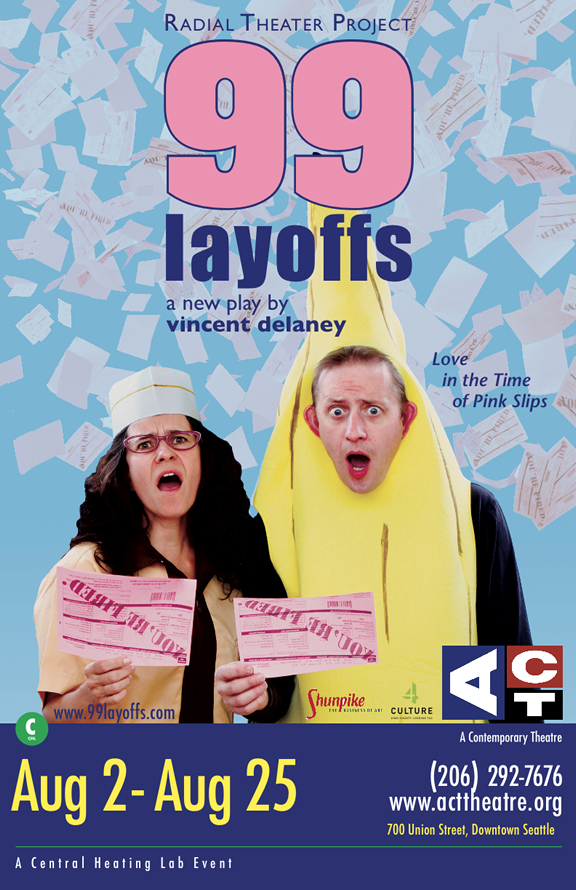We caught up with the brilliant and insightful Vincent Delaney a few weeks ago and have shared our conversation below.
Alright, Vincent thanks for taking the time to share your stories and insights with us today. We’d love to hear the backstory behind a risk you’ve taken – whether big or small, walk us through what it was like and how it ultimately turned out.
After spending almost 20 years as a playwright, I was challenged by an actor to try writing for film and TV. I spent a year avoiding the entire idea because I felt like I already knew who I was a writer. And to be honest I was scared of becoming a beginner again.
I’ve always been someone who fixates on challenges–I remember auditioning for my first play at 15, not because I wanted to act but more because the audition seemed so terrifying, That decision ended up launching me as a theatre artist.
I ended up taking the “screenwriting challenge”, and it really was starting over from scratch. Almost everything playwrights are good at tends to be fairly irrelevant in film–dialogue, scene structure, even the overall energy level and pace. I’ve always loved complex, layered character, and good films are full of them–but they’re created in completely different ways than in theatre. I definitely struggled for a couple years.
The good news is that I ended discovering a completely new voice, and in some ways I think I’m a stronger writer in film than in theatre. At the very least, my playwriting has become sharper and more economical.
I’ve got two features currently in pre-production, a spooky SF thriller called RACHEL and a horror comedy set in Florida called ORLANDO CARES. Turns out I love the genres that playwrights don’t usual get to explore. That would have never happened without diving in as a beginner again.

Vincent, before we move on to more of these sorts of questions, can you take some time to bring our readers up to speed on you and what you do?
My plays tend to be political but hopefully not polemical. I love stories drawn from history, especially those centered on families with complex dynamics. My newest play, THE MALLARD, is about two small town teachers who have lost their jobs for being too honest, and the surprising effect this crisis has on their community. It’s also a comedy, which I think is always the best way to tackle political issues.
The play has been in a series of festivals this year (NY, NJ, CA), and will be featured at Palm Beach Dramaworks (FL) in January. The first full production will be next summer at Premiere Stages in NJ. I feel like the mix of humor, character and timeliness is clicking really well.

What’s the most rewarding aspect of being a creative in your experience?
Without a doubt it’s the possibility of reinventing yourself for each new project. There’s something both scary and so compelling about discovering the world of a new play or film, building it up from the ground, and shaping something completely new and distinct from your previous work. I want each show to exist in its own stylistic universe, and I’ve had to learn how much bravery that decision really requires. But the results will keep you fresh and vibrant as an artist, which is the whole game.
Also being in a community, learning from other writers, collaborating on projects makes the harder work seem so easy. And it makes us much better at the craft. Artists have to seek out community, and writers can easily get left out. We have to make sure that doesn’t happen!

Do you think there is something that non-creatives might struggle to understand about your journey as a creative? Maybe you can shed some light?
We live in a highly transactional society, where black and white, oversimplified thinking is the norm. It was bad before smartphones and it’s even worse now.
It took me 4 colleges and 6 years to earn a degree in English (plus 3 more years for an MFA i n Playwriting). I took a lot of heat from family back then for not “making up my mind” more quickly. But I wasn’t lazy or unfocused, I was just trying to find a space to develop artistically, and it wasn’t easy.
I’m sure artists are often thought of as unfocused, undisciplined, low-income, unrealistic–and nothing is further from the truth (except the low income part).
This isn’t a society that rewards us for our work, and that’s a parameter that we accept going in. You have to do what you love, stay flexible, and find your path. There have been plenty of times I wanted to quit, and usually it was just before something amazing happened that would have never been if I’d dropped out of the game.
Contact Info:
- Website: https://vincentdelaneyplaywright.com
- Instagram: @vincentdelaneywriter
- Facebook: https://www.facebook.com/vincent.delaney.37
- Linkedin: https://www.linkedin.com/in/vincent-delaney-299a10206/
- Other: https://newplayexchange.org/users/127/vincent-delaney






Image Credits
Shane Regan
Mike Peters
Martha Granger
New Century Theatre Company
John Ulman


